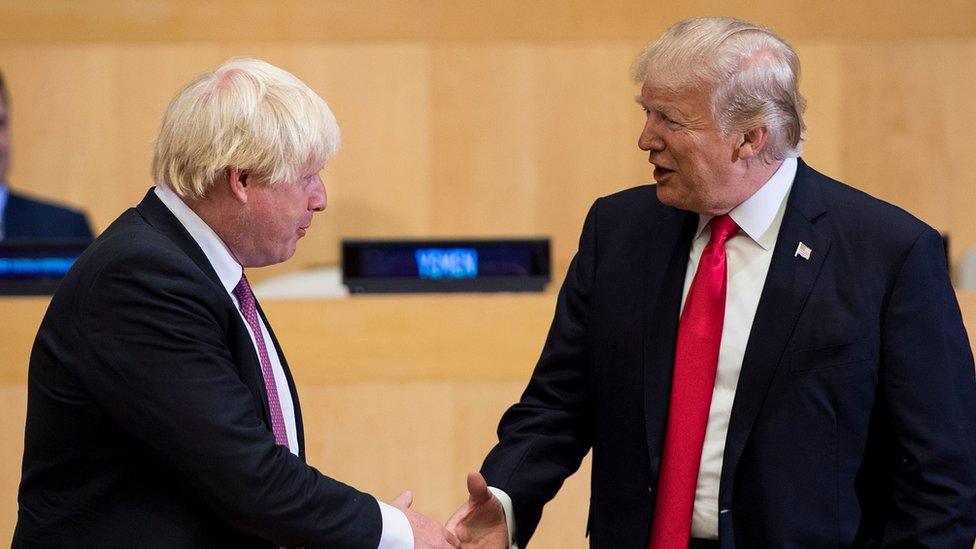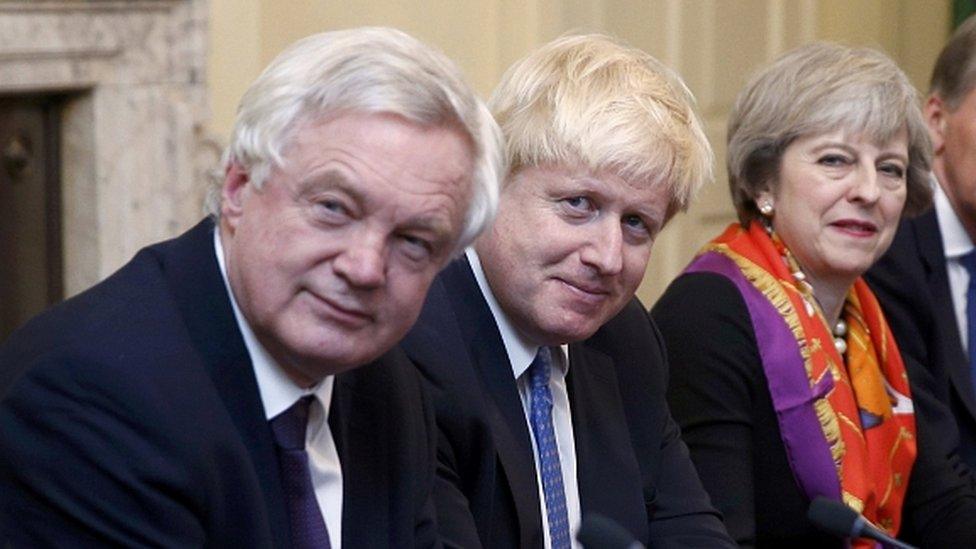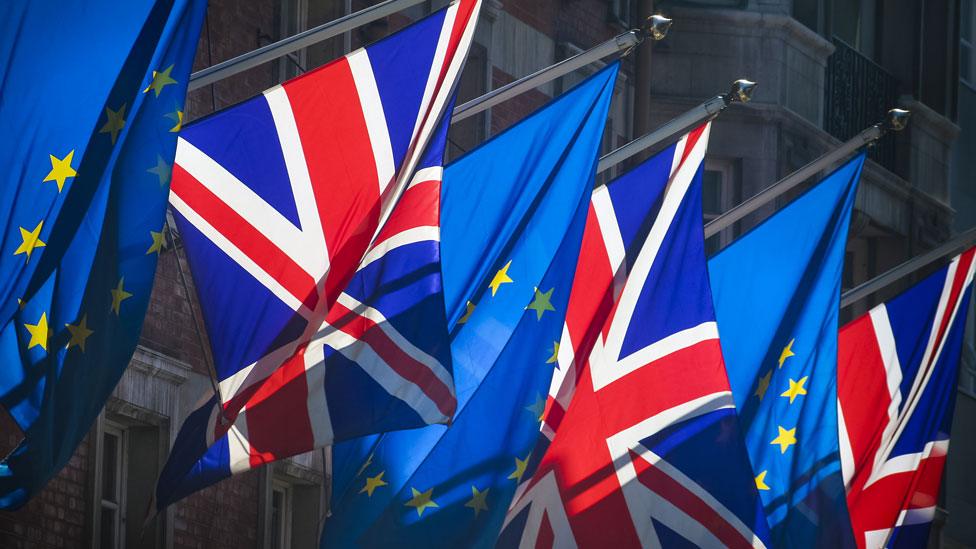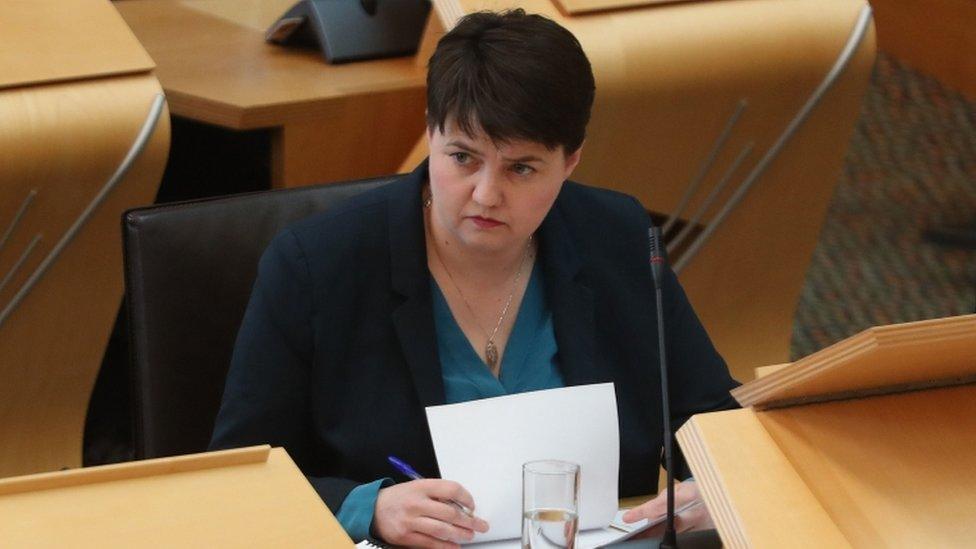Cabinet crisis goes into stasis
- Published

Boris Johnson and Donald Trump are, according to the latter, great chums
The caveat was intriguing, as if President Trump realised mid-phrase that he was about to go too far. The UK, he said, was "in, somewhat, turmoil".
Not, all in all, a particularly helpful comment from an ally. More precisely, not helpful for the political leadership of the UK.
Boris Johnson, the erstwhile foreign secretary, named by Mr Trump as a chum, would find no difficulty in agreeing. Although he might remove the caveat, relying upon the ebullient certainty which has become his oratorical trademark.
Still, even Mr Johnson has resorted to nuanced language, although for a very different purpose. As he resigned, he declared that Theresa May was now leading Britain to a "semi-Brexit".
More precisely, he said this after Downing Street pre-empted his formal letter of resignation and told the wicked media that the foreign sec had quit.
So where are we now? And, to continue the theme of modulated language, was this a demi-coup?
Perhaps - although, in practice, it did not move much beyond the initial gambit. There had been talk that a raft of resignations would follow those of David Davis and Boris J.
Thus far, that has not proved to be substantially the case - although we now have the departure of two Tory vice-chairs.
It is, for now, all reminiscent of 2009 when James Purnell quit Gordon Brown's cabinet. It was expected that others would follow. They did not - and Mr Brown survived in office (until the next general election, that is).

David Davis and Boris Johnson have both quit Mrs May's top team
Did Mr Davis and Mr Johnson co-ordinate their resignations? It would seem likely that they were in contact with each other. But Mr Davis resolutely denies leading an attempt to oust the PM, and an alternative scenario suggests itself.
Mr Davis had been on the verge of going for months previously. As Brexit secretary, charged with negotiating the terms of departure, he believed he could not credibly continue in office when he did not agree with the Chequers deal which would now form the basis of his remit.
Mr Johnson followed suit but after a substantial delay, suggesting that he felt his presence in cabinet was no longer tenable now that Mr Davis had brought the issue of principle to the fore.
It was open at all points for others to quit the cabinet. They did not do so. Perhaps, as in 2009, it was a case of "after you, Claude - no, after you Cecil" (from ITMA; ask your grandparents or look online).
Confidence calculations
More likely, they concluded that resignation would achieve little. Theresa May had declared that she would not stand down, even in the event that 48 MPs signed a letter demanding a vote as to whether she retained the parliamentary party's confidence.
It was further calculated by most that she would win such a confidence vote. The issue then would be whether the tally against her consisted only of the most obvious Brexit enthusiasts - or whether it spread beyond them.
We would have been back into nuance again, this time via arithmetic. Remember what happened when Margaret Thatcher was forced from office. She won the first ballot of MPs - but not by enough to avoid a second contest. In short, she won but she lost - and stepped down.
Those close to the PM say that she is remarkably resilient, despite the caricature of her as occasionally uncertain. They say that she contrives to sound upbeat even when events would have others "crawling into a dark cupboard".

So the demi-coup, if such it was, was mostly thwarted at source. Thus far. However, there were other calculations. Few in the party, frankly, are outright, unalloyed admirers of Mrs May. There are no "Mayites" - although that may be partly because the word itself is awkward.
Many respect her. Many admire her stamina and determination. Few adore her as they did Mrs Thatcher.
Their support is calculated. The former party chairman, Grant Shapps, put it well when he noted that it would take three months to stage a leadership contest - a quarter-year which might be better spent negotiating the terms of Brexit.
Mrs May made that point to critics. And he drew a further, precise lesson. You can move to bring me down, she noted. But, if you do, might there have to be a general election? If there is, are you sure that the Tories would win? Really sure?
I know, I know, a cheeky gambit from the leader who prompted a thoroughly unnecessary electoral contest in 2017, losing her party's commons majority in the process. But needs must.
Some say, behind their hands, that the hard Brexiteers bottled it. That they ducked the chance to force a vote of confidence.
Well, maybe so. But I reckon they looked at the climate of uncertainty in Britain. Real uncertainty, real anxiety, among real people, worried about the economy and their jobs, worried about the future.
And they calculated that any organisation, any grouping, any individual which added to that anxiety in any way by further destabilising the body politic would, rightly, pay a political price. Hence the relative - I stress, relative - stasis after the crisis of a double cabinet departure.

Ruth Davidson has thrown her backing behind Theresa May
What then of the Chequers plan? It goes forward. Will it win EU support? Team May obviously hope so - and believe that there will be backing once there is political buy-in from European ministers rather than the civil service in the Commission.
They argue that the Commission, perhaps understandably, regards EU rules and the acquis communitaire as tantamount to Holy writ, incapable of being defiled or finessed.
They argue, however, that the EU is palpably anxious to move on from the Brexit issue, to tackle such matters as immigration and economic growth. Given that, they believe - they hope - that EU ministers will ultimately over-rule objections from the purists to cut a deal. If only to get Brexit off the books.
Constructive ambiguity
And what for Scotland? Once again, we have a substantial argument which is a proxy for the independence debate.
Ruth Davidson told me today in an interview that the SNP would eventually have to choose between the Chequers deal - which she characterised as advantageous for Scotland - and no deal at all.
It will not surprise you to learn that Nicola Sturgeon reads things rather differently. She says there is no Commons majority for the Brexit deal but that one could be constructed for remaining in the single market and the customs union.
Ultimately, nuance must end. But not, I suspect, for now. After all, the EU itself has long been a product of constructive ambiguity.